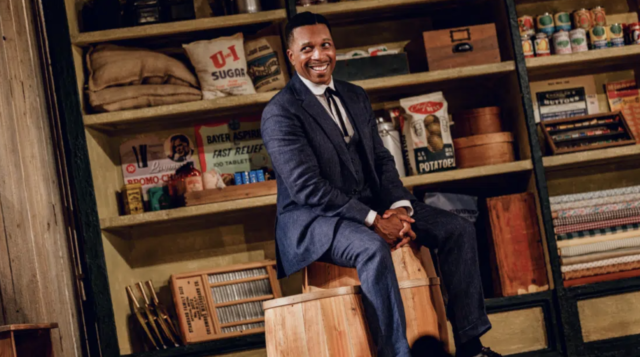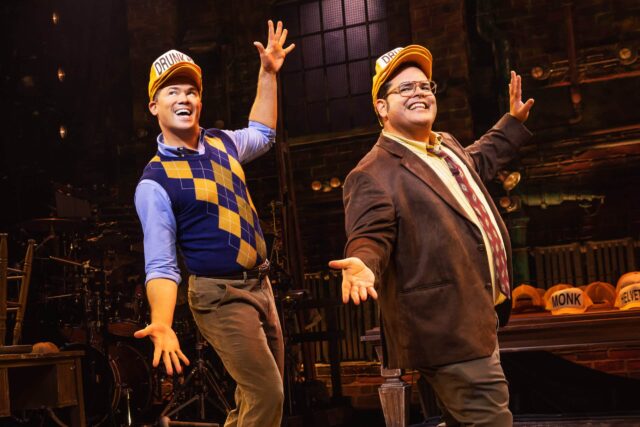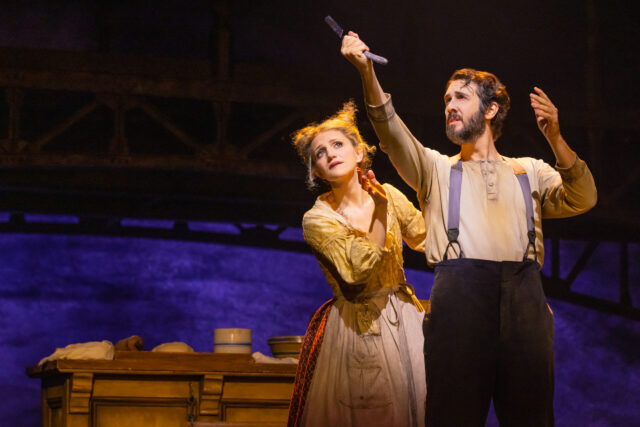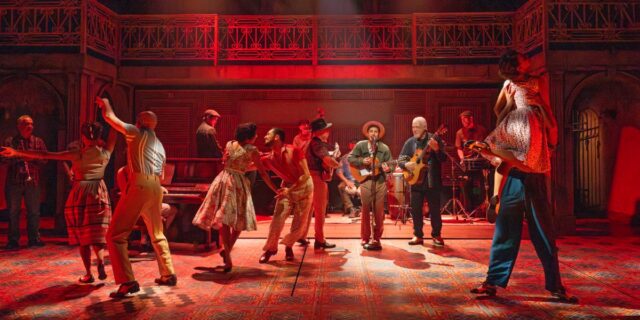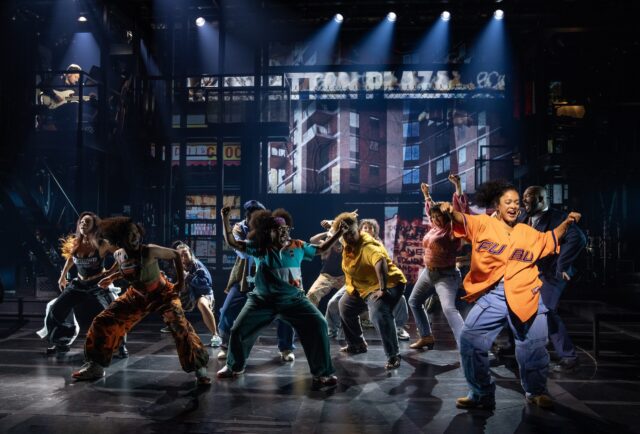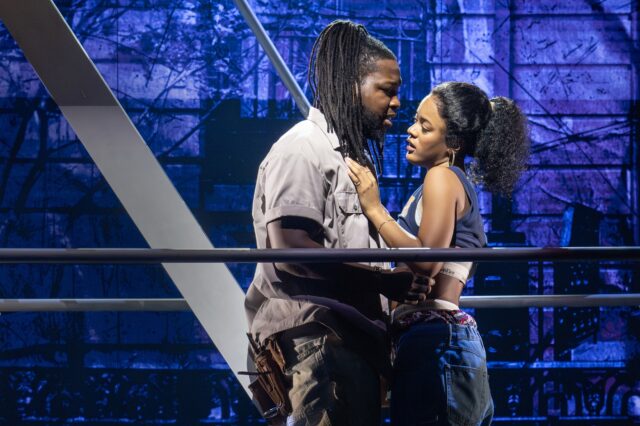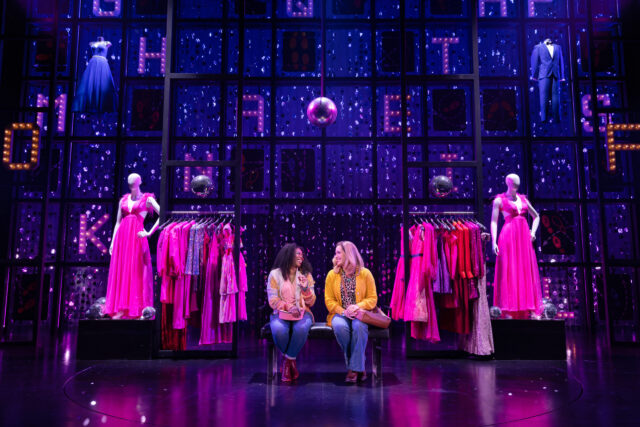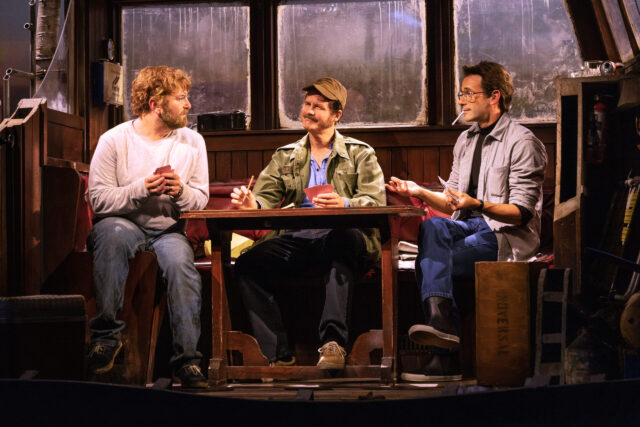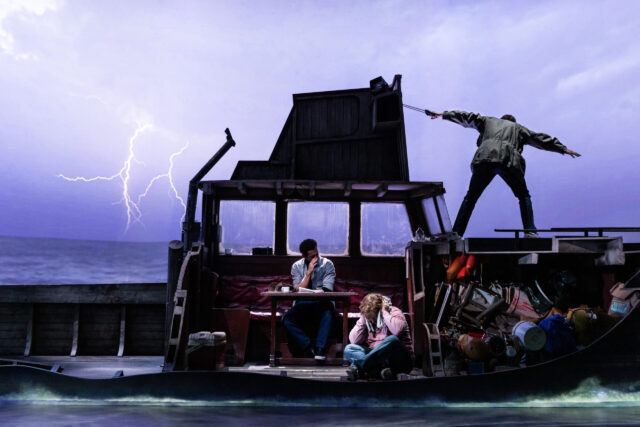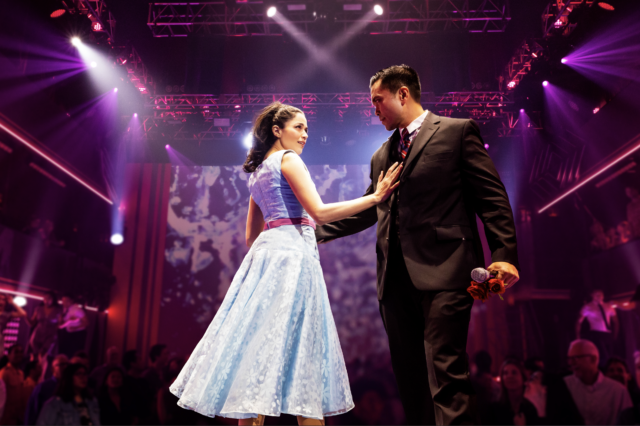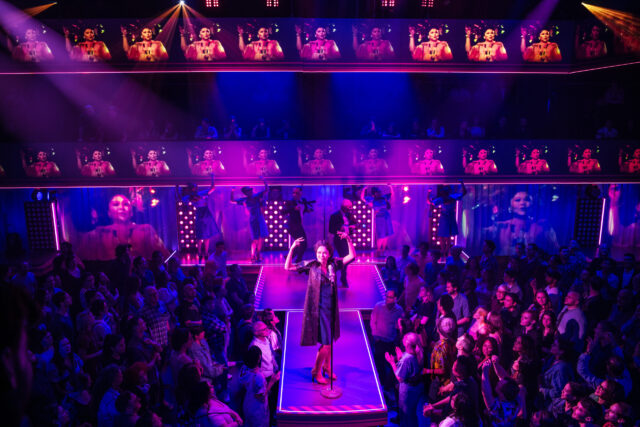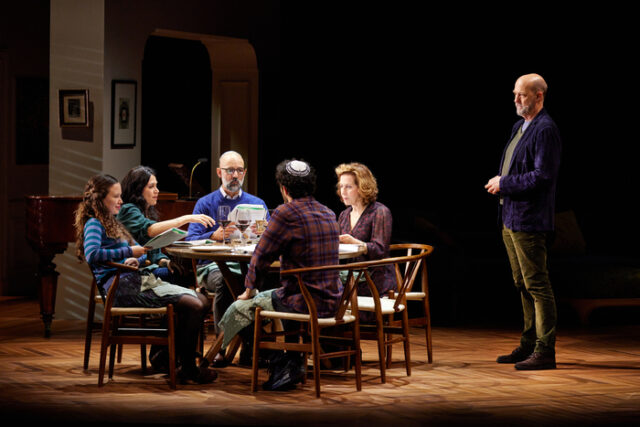
Patrick (Anthony Edwards) watches his family in Joshua Harmon’s Prayer for the French Republic on Broadway (photo by Jeremy Daniel)
PRAYER FOR THE FRENCH REPUBLIC
Samuel J. Friedman Theatre
261 West Forty-Seventh St. between Broadway & Eighth Ave.
Tuesday – Sunday through March 3, $94-$318
www.manhattantheatreclub.com
Success off Broadway is no guarantee of a hit on Broadway. Transferring to a bigger house, the passing of time, tweaking the script, cast changes, and sociopolitical events can all have an impact on a play or musical moving to the Great White Way.
While such shows as Hamilton, The Humans, Fun Home, Sweat, Fat Ham, and Into the Woods were sensational on and off Broadway, others ran into trouble.
Girl from the North Country was inspired at the Public but felt stale at the Belasco. Ntozake Shange’s for colored girls who have considered suicide/ when the rainbow is enuf was electrifying at the Public but was completely reimagined at the Booth, and not for the better. Slave Play was provocative at New York Theatre Workshop but lost its power at the Golden. At Playwrights Horizons in 2018, Larissa FastHorse’s The Thanksgiving Play was a brilliant farce, but five years later at the Helen Hayes, with a new cast and creative team, it was dry and disappointing, like overheated leftovers.
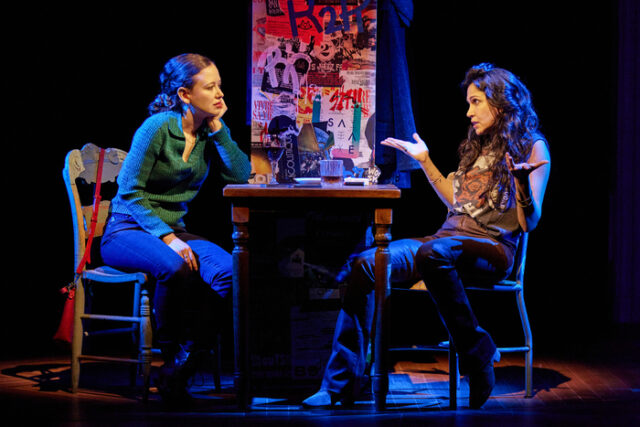
Molly (Molly Ranson) and Elodie (Francis Benhamou) argue about Israel in Prayer for the French Republic (photo by Jeremy Daniel)
I loved Prayer for the French Republic when it debuted at MTC at New York City Center, but two years later, it doesn’t feel as sharp and incisive at the Samuel J. Friedman, and I’ve been scratching my head to try to figure out why. Joshua Harmon’s play is still an impressive piece of work, but it doesn’t have the same power now that it had then. It was named Outstanding Play at the 2022 Drama Desk Awards, receiving my vote, but I wouldn’t have voted for this current version.
The story takes place in Paris in 1944–46 and 2016–17, following the trials and tribulations of the Salomon family, who have been making pianos since 1855. During WWII, Irma and Adolphe choose to remain in France as they worry about the fate of their children. In contemporary times, their descendants face a vicious antisemitism that forces them to question whether they have to leave their home. The script and the creative team are essentially the same, including the director, David Cromer, who guided The Band’s Visit to a slew of awards both on and off Broadway. Only five of the eleven cast members are back, so that could be part of the issue. One is notably stronger than his predecessor, but another sadly falters in a key role.
However, the scintillating scene between Elodie and her distant cousin Molly as they argue about Israel is played by the same actors on the same set, yet it fails to ignite as it previously did. I think it was more than just moving to a bigger venue; the events of October 7 and the aftermath involving Hamas’s terrorist attack and Israel’s military response have impacted everyone’s views of the Middle East. The glue that held the off-Broadway show together was Rich Topol as Patrick, the Salomon brother who also serves as narrator and who has a different view of Judaism than the rest of his family. Notably, Topol just finished a run as a Jew who leaves Poland shortly before a brutal 1941 pogrom in Igor Golyak’s poignant and inventive adaptation of Tadeusz Słobodzianek’s Our Class, which is filled with a frightening sense of urgency.
Two previous Harmon shows — Significant Other and Bad Jews — were just as good, if not better, when they transferred to bigger venues; Prayer is a conundrum.
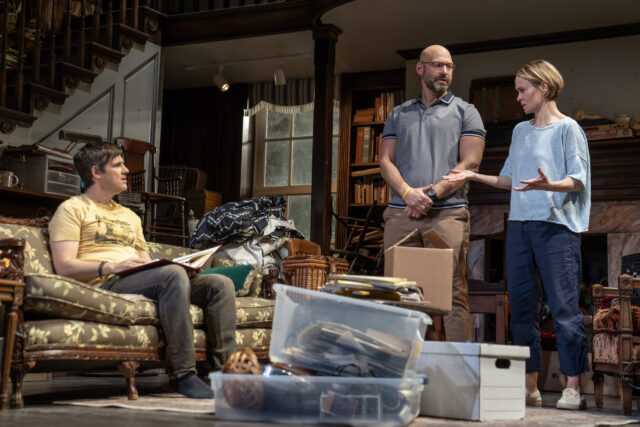
Three siblings battle over their family’s legacy in Appropriate (photo by Joan Marcus)
APPROPRIATE
Helen Hayes Theater
240 West 44th St.
Tuesday – Sunday through March 3, $209-$269
Moving to the Belasco Theatre March 25 – June 30, $79-$318
2st.com
Ten years ago, I saw Branden Jacobs-Jenkins’s Appropriate at the Signature. The play is about three siblings of the white Lafayette family who have returned to the clan’s dilapidated southern plantation to sell it to pay off debts following the death of their father. The siblings are not very close — youngest brother Franz has not been heard from in a decade — but their relationships are further strained when a home-made book of photographs of lynched black men is found in the house. The possibility that their father was a racist infuriates Toni, who cared for the ailing patriarch, and she becomes even more incensed when her Jewish sister-in-law, Rachael, who is married to Bo, claims that he was antisemitic as well.
The Signature show was directed by Liesl Tommy and starred Johanna Day, Michael Laurence, and Maddie Corman as the siblings. In 2014, I wrote, “Appropriate begins with solid character development while raising intriguing social and moral issues without getting didactic. But the story goes off the rails in the second act as various secrets emerge and the vitriol reaches even higher levels. Perhaps most unfortunate, there’s a moment that seems like the perfect ending; the lights go out, and just as the audience is ready to applaud, the play continues through a disappointing, unnecessary coda. Jacobs-Jenkins clutters what is a fascinating premise with too many disparate elements.”
I still feel the same about the ending, even with an insightful added finale, but everything else about the play, at the Helen Hayes through March 3 before moving to the Belasco for three more months, is better this time around. Jacobs-Jenkins (The Comeuppance, An Octoroon), a relentless reviser, has improved the script immensely, with dialogue that hits harder and deeper. Director Lila Neugebauer grabs hold of the complex plot and never lets go; the confrontations among the siblings, their significant others, and the next generation are scintillating; at times it’s so severe and merciless, so intimate, that you feel guilty for watching it unfold but you can’t look away for a second.
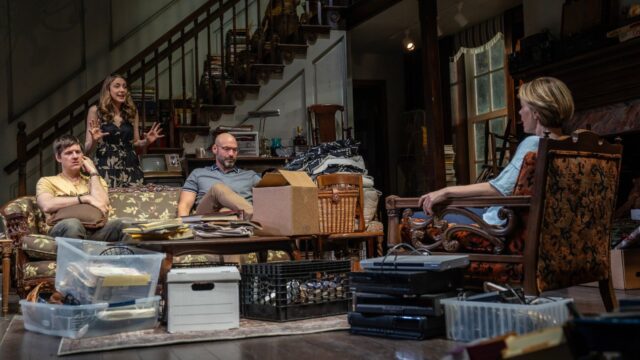
Branden Jacobs-Jenkins’s Appropriate is reborn on Broadway (photo by Joan Marcus)
Sarah Paulson is a force of nature as Toni, an embittered woman with deep scars and no filter, exploding with vitriolic accusations she will never be able to take back. Corey Stoll goes toe-to-toe with her as Bo, who is having financial difficulties that may be affecting his ethics, while Natalie Gold is tough as nails as Rachael, who is not afraid to get in the ring with them. Michael Esper imbues Franz with a gentleness that belies the character’s past, while his younger girlfriend, a flower child named River played sweetly by Elle Fanning, stands firmly by his side. And the set, by dots, becomes more of an integral element, both what’s inside and lurking outside.
The Broadway production of Appropriate, the title of which has several different meanings and pronunciations, feels both of its time and timeless, an intense tale about the Black experience in America that has no people of color in its cast. A lot has changed in the world since 2014: Barack Obama finished his second term, followed by Donald Trump, both having defeated Hillary Clinton, the former in the primary, the latter in the general. The police killing of George Floyd led to the Black Lives Matter protests and a reckoning with this country’s shameful legacy of slavery and racism. And antisemitism is again on the rise, with October 7 only making it worse.
This vital new adaptation of Appropriate captures all of that and more in unforgettable ways.
[Mark Rifkin is a Brooklyn-born, Manhattan-based writer and editor; you can follow him on Substack here.]
